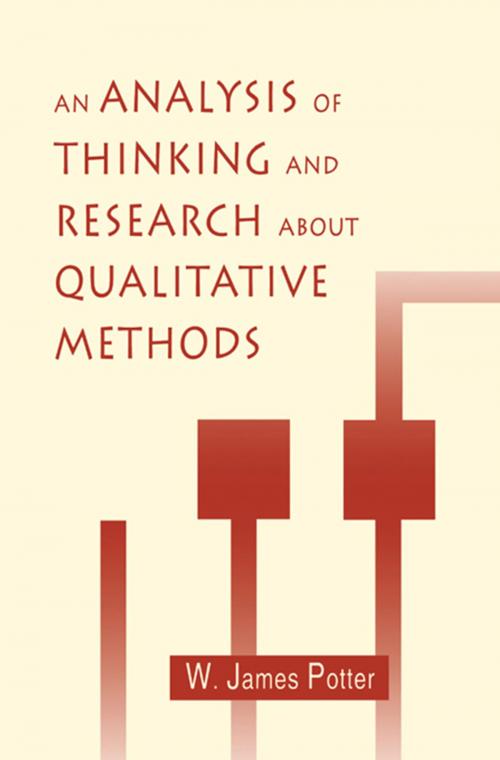An Analysis of Thinking and Research About Qualitative Methods
Nonfiction, Reference & Language, Language Arts, Communication| Author: | W. James Potter | ISBN: | 9781136688669 |
| Publisher: | Taylor and Francis | Publication: | November 5, 2013 |
| Imprint: | Routledge | Language: | English |
| Author: | W. James Potter |
| ISBN: | 9781136688669 |
| Publisher: | Taylor and Francis |
| Publication: | November 5, 2013 |
| Imprint: | Routledge |
| Language: | English |
Written for social science scholars who want to learn more about the qualitative way of thinking, this book addresses the full continuum of issues about the qualitative methodologies. At one end of that continuum are the deeply philosophical concerns of ontology and epistemology. At the other -- concrete -- end of that continuum are the practical issues of what is considered evidence: How does one go about gathering evidence? Where, when, and how does one analyze evidence? What are the alternative ways of dealing with tone and voice in writing qualitative research? The attention to practical, concrete issues makes this book useful as a handbook providing a great deal of vital information to scholars who want a guide to making decisions as they navigate their research questions through the qualitative realm.
Uniquely qualified to write such a book, Potter has earned PhDs in both qualitative methods (with a concentration in linguistics and field studies) and in quantitative methods (with a concentration in social science theory and statistics). The book is not an ideological argument that glorifies one system of thinking while attempting to persuade the reader that other systems of thinking are bankrupt. Rather, the book presents a respectful, balanced analysis of the strengths and weaknesses of the qualitative approach.
The book builds to a controversial final chapter entitled "Is Convergence a Possibility?" in which Potter synthesizes a conclusion from his analysis of a wide range of qualitative studies across three broad topic areas -- text focused research, audience focused research, and institution focused research -- and across seven major qualitative methodologies -- ethnography, ethnomethodology, reception study, ecological psychology, symbolic interactionism, cultural studies, and textual analysis. His conclusion is that not only is there a possibility of a convergence between qualitative and quantitative approaches, but that the convergence has already happened.
The book includes an appendix in which 95 books and articles using the qualitative approach are abstracted and analyzed to illustrate key points of methodology and methods. It also includes subject and author indexes.
Written for social science scholars who want to learn more about the qualitative way of thinking, this book addresses the full continuum of issues about the qualitative methodologies. At one end of that continuum are the deeply philosophical concerns of ontology and epistemology. At the other -- concrete -- end of that continuum are the practical issues of what is considered evidence: How does one go about gathering evidence? Where, when, and how does one analyze evidence? What are the alternative ways of dealing with tone and voice in writing qualitative research? The attention to practical, concrete issues makes this book useful as a handbook providing a great deal of vital information to scholars who want a guide to making decisions as they navigate their research questions through the qualitative realm.
Uniquely qualified to write such a book, Potter has earned PhDs in both qualitative methods (with a concentration in linguistics and field studies) and in quantitative methods (with a concentration in social science theory and statistics). The book is not an ideological argument that glorifies one system of thinking while attempting to persuade the reader that other systems of thinking are bankrupt. Rather, the book presents a respectful, balanced analysis of the strengths and weaknesses of the qualitative approach.
The book builds to a controversial final chapter entitled "Is Convergence a Possibility?" in which Potter synthesizes a conclusion from his analysis of a wide range of qualitative studies across three broad topic areas -- text focused research, audience focused research, and institution focused research -- and across seven major qualitative methodologies -- ethnography, ethnomethodology, reception study, ecological psychology, symbolic interactionism, cultural studies, and textual analysis. His conclusion is that not only is there a possibility of a convergence between qualitative and quantitative approaches, but that the convergence has already happened.
The book includes an appendix in which 95 books and articles using the qualitative approach are abstracted and analyzed to illustrate key points of methodology and methods. It also includes subject and author indexes.















